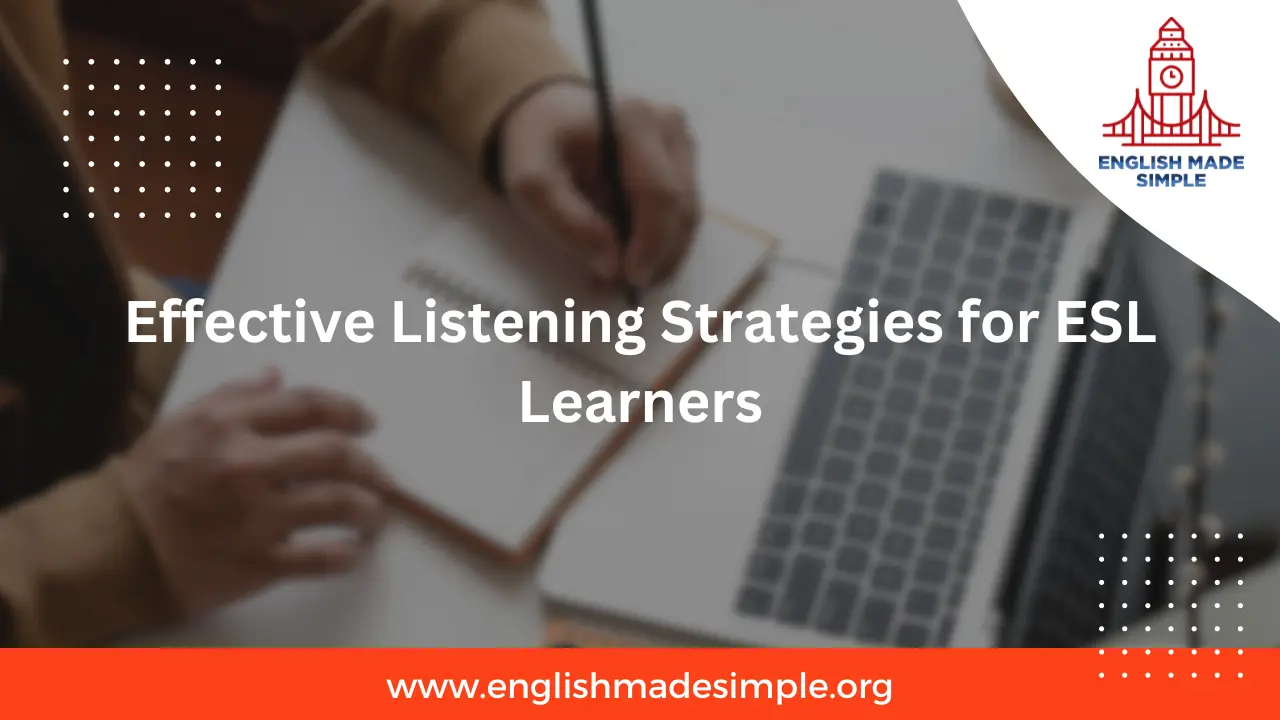
Effective Listening Strategies for ESL Learners
Listening is a fundamental skill in language acquisition, especially for ESL (English as a Second Language) learners. Effective listening not only helps in understanding spoken English but also improves speaking, reading, and writing skills. This blog will explore various strategies that ESL learners can use to enhance their listening abilities.
Importance of Listening in Language Learning
Listening is crucial because:
- Comprehension: It allows learners to understand spoken language, essential for effective communication.
- Pronunciation: Exposure to native speakers helps improve pronunciation and accent.
- Vocabulary: Listening introduces learners to new words and phrases in context.
- Fluency: It aids in developing natural speech patterns and rhythm.
Strategies to Improve Listening Skills
Active Listening:
- Tip: Focus entirely on the speaker, avoiding distractions. Pay attention to words, tone, and body language.
- Practice: Engage in conversations where you concentrate solely on listening, without preparing a response.
Use Authentic Materials:
- Tip: Listen to materials created by and for native speakers, such as podcasts, movies, news, and radio shows.
- Practice: Start with slower speech (audiobooks or children’s programs) and gradually move to more complex materials.
Repeat and Mimic:
- Tip: Repeat phrases or sentences after the speaker to improve pronunciation and intonation.
- Practice: Use shadowing techniques, where you listen to a sentence and repeat it immediately, mimicking the speaker’s tone and pace.
Take Notes:
- Tip: Jot down key points, unfamiliar words, or phrases while listening.
- Practice: During a podcast or lecture, pause and write down important information, then review and research any new vocabulary.
Watch with Subtitles:
- Tip: Use subtitles to understand spoken content better, then gradually reduce reliance on them.
- Practice: Watch a movie or show with English subtitles, then try without them to test comprehension.
Engage in Interactive Listening:
- Tip: Participate in conversations, asking for clarification or repetition if needed.
- Practice: Join language exchange programs or online discussion groups to practice active listening and speaking.
Practice Predictive Listening:
- Tip: Predict what the speaker will say next based on context and prior knowledge.
- Practice: Listen to a story or conversation, pause periodically, and predict what will come next. Compare your predictions with the actual content.
Use Listening Exercises and Apps:
- Tip: Utilize language learning apps that offer structured listening exercises.
- Practice: Apps like Duolingo, Rosetta Stone, and FluentU provide targeted listening practices with immediate feedback.
Focus on Different Accents:
- Tip: Expose yourself to various English accents to become familiar with different pronunciations and dialects.
- Practice: Listen to speakers from different English-speaking countries (e.g., the UK, the US, Australia) through movies, news, or podcasts.
Reflect and Summarize:
- Tip: After listening, summarize what you heard in your own words.
- Practice: After listening to a news segment, write or speak a summary of the main points. This reinforces understanding and retention.
Practical Listening Exercises
Dictation Practice:
- Listen to a short passage and write down exactly what you hear. This improves attention to detail and spelling.
Role-Playing:
- Practice common scenarios (e.g., ordering food, asking for directions) with a partner. This enhances contextual listening and speaking.
Listening Logs:
- Keep a journal of daily listening activities, noting new words and phrases. Review and use these in conversations or writing.
Interactive Listening Games:
- Engage in games that require listening for details, such as Simon Says or listening-based quizzes.
Conclusion
Improving listening skills is vital for ESL learners to achieve fluency and comprehension in English. By incorporating these strategies and practicing regularly, learners can enhance their ability to understand and communicate effectively in English. Remember, the key to mastering listening skills is consistent practice and exposure to a variety of listening materials. Happy learning!
